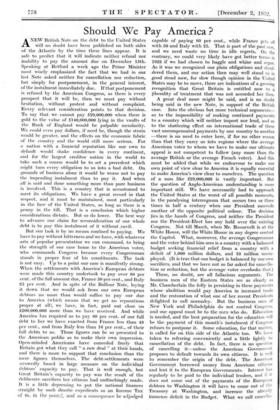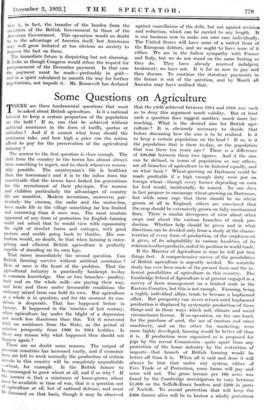Should We Pay America ?
ANEW British Note on the debt to the United States will no doubt have been published on both sides of the Atlantic by the time these lines appear. It is safe to predict that it will indicate neither refusal nor inability to pay the amount due on December 15th. Speaking at Retford a week ago the Prime Minister most wisely emphasized the fact that we had in our last Note asked neither for cancellation nor reduction, but simply for postponement, in the general interest, of the instalment immediately due. If that postponement is refused by the American Congress, as there is every prospect that it will be, then we must pay without hesitation, without protest and without complaint. Every relevant consideration points to that decision. To say that we cannot pay £29,000,000 when there is gold to the value of £140,000,000 lying in the vaults of the Bank of England would be palpable mendacity. We could even pay dollars, if need be, though the strain would be greater, and the effects on the economic fabric of the country and the world still more serious. For a nation with a financial reputation like our own to default would shake confidence in every continent, and for the largest creditor nation in the world to take such a course would be to set a precedent which might turn every obligation to us into a bad debt. On grounds of business alone it would be worse not to pay the impending instalment than to pay it. And when all is said and done something more than pure business is involved. This is a country that is accustomed to meet its obligations. We have a great record in that respect, and it must be maintained, most particularly in the face of the United States, so long as there is a penny in the till. That is a conclusion which higher considerations dictate. But so do lower. The best way to advance our claim for reconsideration of our whole debt is to pay this instalment of it without cavil.
But our task is by no means confined to paying. We have to pay without bitterness and we have, with whatever arts of popular presentation we can command, to bring the strength of our case home to the American voter, who commands Congress because every Congressman stands in proper fear of his constituents. The task is not easy. Up to a point our case is manifestly strong. When the settlements with America's European debtors were made this country undertook to pay over 80 per cent. of the full amount due, France 50 per cent., and Italy 25 per cent. And in spite of the Balfour Note, laying it down that we would ask from our own European debtors no more than would suffice to pay our due to America (which means that we get no reparations proper at all), we have, in fact, paid out close on £200,000,000 more than we have received. And while America has required us to pay 80 per cent. of our full debt to her we have exacted from France less than 43 per cent., and from Italy less than 16 per cent., of their full debts to us. Those figures can be so presented to the American public as to make their own impression. Open-minded Americans have conceded freely that Britain got what they call " a raw deal " at their hands, and there is more to support that conclusion than the mere figures themselves. The debt-settlements were avowedly based in large measure on the individual debtors' capacity to pay. That is well enough, but Great Britain's capacity to pay was the result of the deliberate sacrifices her citizens had unflinchingly made. It is a little depressing to put the national finances straight by such drastic expedients as an Income Tax of Gs. in the pound, and as a consequence be adjudged capable of paying 80 per cent., while France gets off with .50 and Italy with 25. That is part of the past now, and we need waste no time in idle regrets. On the contrary, we could very likely have got better terms in 1923 if we had chosen to haggle and whine and argue. As it was we recognized our plain obligations and shoul- . dered them, and our action then may well stand us in good stead now, for slow though opinion in the United States may be to move, there are indications of a growing recognition that Great Britain is entitled now to a liberality of treatment that was not accorded her then.
A great deal more might be said, and is no doubt being said in the new Note, in support of the British case. Into the obvious but more technical arguments— as to the impossibility of making continued payments to a country which will neither import nor lend, and as to the shattering effect on international trade of these vast uncompensated payments by one country to another —there is no need to enter here, if for no other reason than that they carry us into regions where the average American voter to whom we have to make our ultimate appeal is not competent to follow (any more than the average British or the average French voter). And this must be added that while we endeavour to make our own point of view clear to America it is equally essential to make America's view clear to ourselves. The question of a sum like £29,000,000 is vastly important. But the question of Anglo-American understanding is more important still. We have necessarily had to approach the United States at the worst of all possible moments, in the paralysing interregnum that occurs two or three times in half a century when one President succeeds another of the opposite political colour. The decision lies in the hands of Congress, and neither the President nor the President-Elect has any hold over the existing Congress. Not till March, when Mr. Roosevelt is at the White House, will the White House in any degree control the Capitol. What, moreover, the average Congressman and the voter behind him sees is a country with a balanced budget seeking financial relief from a country with a deficit of 1,000 million dollars, and 10 million unem- ployed. (It is true that our budget is balanced by our own sacrifices, and that we have not so far asked for cancella- tion or reduction, but the average voter overlooks that.) These, no doubt, are all fallacious arguments. The business men of the Eastern States see as clearly as Mr. Chamberlain the folly in persisting in these payments whose abolition would pay America in increased trade and the restoration of what one of her recent Presidents delighted to call normalcy. But the business men of New York and Philadelphia do not control Congress, and our appeal must be to the men who do. Education is needed, and the best preparation for the education will be the payment of this month's instalment if Congress refuses to postpone it. Some education, for that matter, is called for on this side of the Atlantic too. We have taken to referring conveniently and a little lightly to cancellation of the debt. In fact, there is no question of cancelling it—unless the American Government proposes to default towards its own citizens. R is well to remember the origin of the debt. The American Government borrowed money from American citizens and lent it to the European Governments. Interest has regularly to be paid to the individual lenders, and if it does not come out of the payments of the European debtors to Washington it will have to come out of the Treasury at Washington, and increase the already immense deficit in the Budget. What we call cancella- tion is, in fact, the transfer of the burden from the shoulders of the British Government to those of the American Government. This operation would no doubt be to the advantage of America itself, but Americans may well grow irritated at too obvious an anxiety to impress the fact on them.
The immediate future is disquieting but not alarming. It looks as though Congress would refuse the request for postponement of • the December payMent. In that case the payment must be made—preferably in gold— and in a spirit calculated to smooth the way for further negotiations; not impede it. Mr. Roosevelt has declared against cancellation of the debt, but not against revision and reduction, which can be carried to any length. It is our business now to make our own case individually. The United States will have none of a united front of the European debtors, and we ought to have none of it either. We are in the fullest sympathy with France and Italy, but we do not stand on the same footing as they do. They have already received indulgent treatment; we have not. It is for us now to pay and then discuss. To continue the statutory payments in the future is out of the question, and by March all America may have realized that.











































 Previous page
Previous page